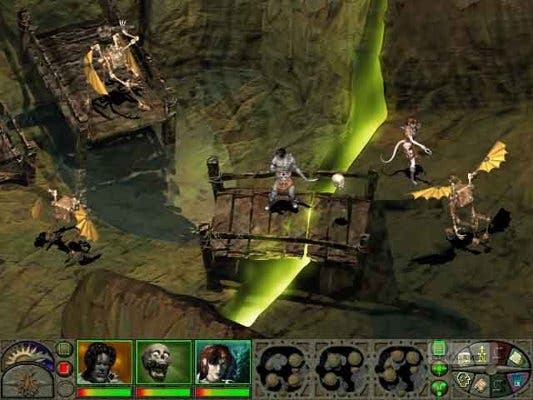Obsidian's Chris Avellone
Alpha top dog.
Saying I'm a fan of Planescape: Torment is a bit like saying that Vlad III Dracula enjoyed a spot of impaling - it gets the point across, but doesn't quite convey the extent of the fervour.
It doesn't reveal how Vlad took the time to ensure his preferred method of execution was as painful and humiliating as possible, nor the number of poor souls he consigned to such a fate. Similarly, it doesn't address the fact that I grunt "I feel stronger" whenever I finish my daily exercise routine, and sometimes wish my wife had a fleshy tail and a Scottish accent.
However, I am eternally grateful to the man who, by and large, made my dysfunction possible: Chris Avellone, whom you may also know for having a hand in Alpha Protocol, Knights of the Old Republic II, Fallout 2, and, perhaps less excitingly, Descent to Undermountain.
Herein, he discusses Planescape: Torment among other things, such as the RPG Codex, Alpha Protocol, and why he can't say anything about Fallout: New Vegas.

Well, it was a mixed bag. I spent most of the time at Obsidian just playing either Fallout 3 or catching up on some of the other builds we have here. But I did have time to catch up with some friends!
I enjoyed it quite a bit. Some of the things I really liked about it were... Well, in Fallout 1 and Fallout 2, a lot of the special skill structure they had for the game system actually either ended up being only useful in special cases, like Repair. That, or they had a time limit involved with them, like Doctor. Doctor worked in Fallout 1 because the game had a time pressure, and it was faster to use the skill than buy Stimpaks. But when they took the time limit away in Fallout 2 - and they did the patch that removed it from Fallout 1 - that skill wasn't really balanced anymore. I like very much how Fallout 3 took a lot of skills that had issues before and made them relevant - like, Repair is pretty damn important in Fallout 3!
The only drawback I can think of so far is that I made the mistake of starting out with a four-strength character during my first playthrough, and the amount of stuff you need to carry around ... I was constantly using mailboxes to store stuff, and hopping back and forth between Megaton and my little safehouse to sell it all! I wish I'd made my strength higher.

Well, I wanted to bump up my intelligence and charisma as high as possible, because I wanted all the speech options. Generally, whenever I go into an RPG, I want to see every single possible way of interacting with someone, so I chose, for example, the Black Widow perk - I think that's the name - and the Child at Heart perk, too, because I wanted to see all the dialogue options with the kids and the opposite sex, and things like that.
Yeah, absolutely. I guess my critique would be that Bethesda's always gotten the openworld game mechanic down pretty well. They have a tradition of it; they understand the design mechanics involved with that, and I believe very much that the Fallout world, by design, all the way from the first one, was always intended to be a go-anywhere-you-want-and-do-anything open world. And I think that Bethesda's design methodology and the Fallout world have always been pretty complementary.
Umm... Well, the weird thing is, of all the games I've ...
Well, look, in all the conversations I've had with Tim Cain and Leonard Boyarsky, we've never discussed it. It's always been that way.
